Abstract
Non-organic failure to thrive has traditionally been regarded as due primarily to maternal rejection and neglect. A critical reappraisal of the evidence suggests a more balanced view of the mother-child relationship should be taken. A classification of the condition, founded on facts not concepts, is urgently required. Non-organic failure to thrive should be viewed in a multidimensional context, in which potential influences upon the symptomatic infant are considered. Inadequacy of nutrition is caused by both a failure of adequate provision of food and by inadequate intake. A vicious circle of maladaptive behavioural interaction between caregiver and infant is often present, sustained by high emotional tensions. Clinical intervention should aim to clarify the contributions made by both caregiver and infant to that interaction and thus break the cycle. The basis on which intervention is made should be direct observation of the parent and child relationship in as many different environmental contexts as feasible, especially during feeding. The multidisciplinary team has an important role to play in management. An emphasis on parental culpability in the aetiology of non-organic failure to thrive, in the absence of direct evidence of neglect, is wrong.
Full text
PDF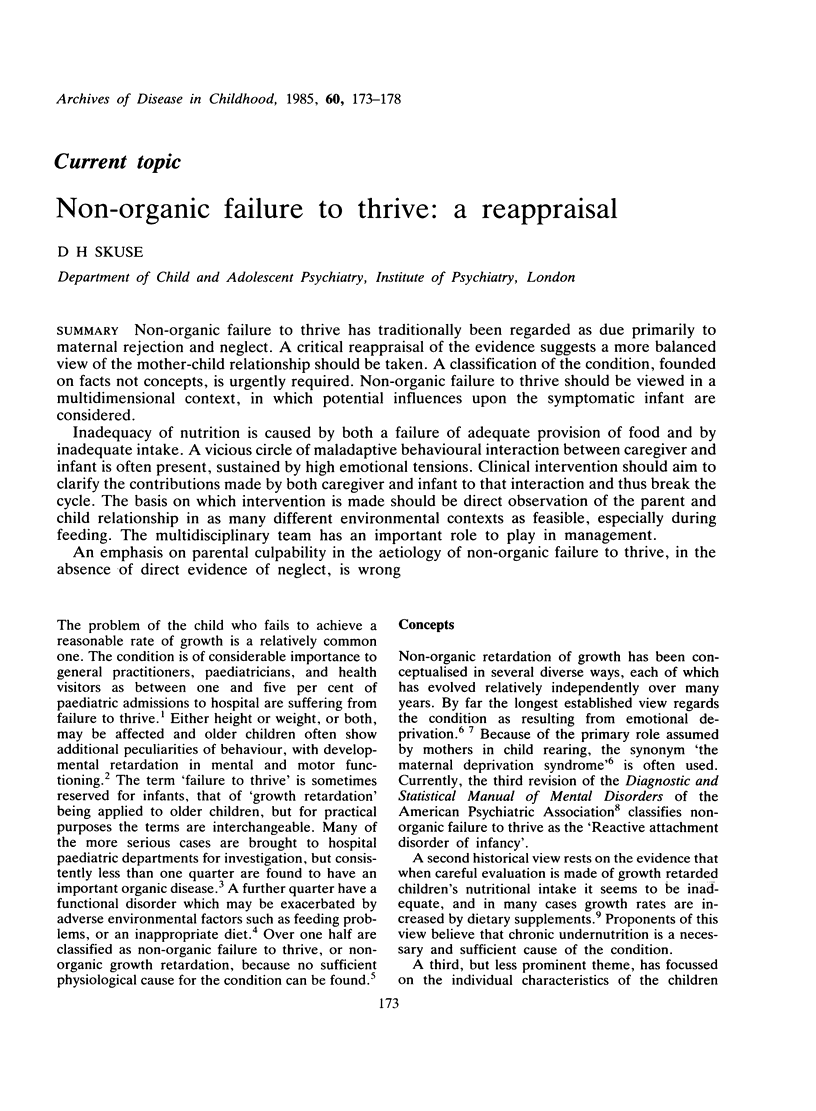
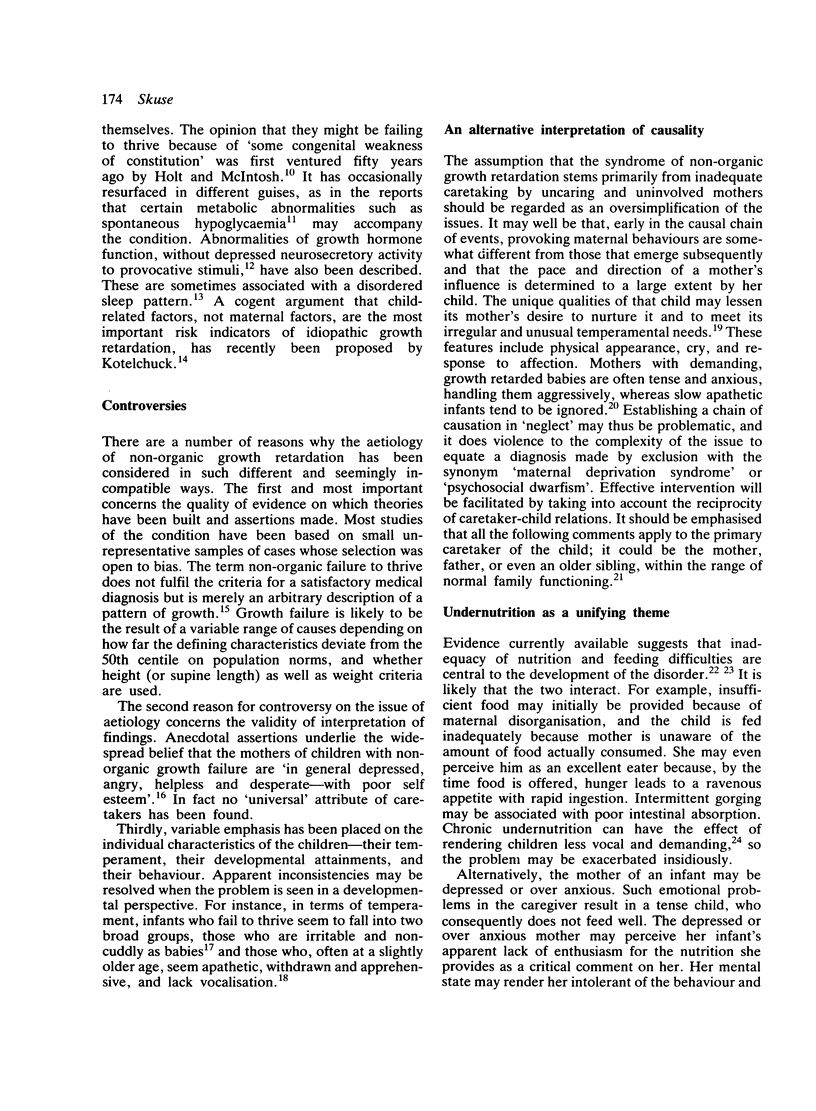
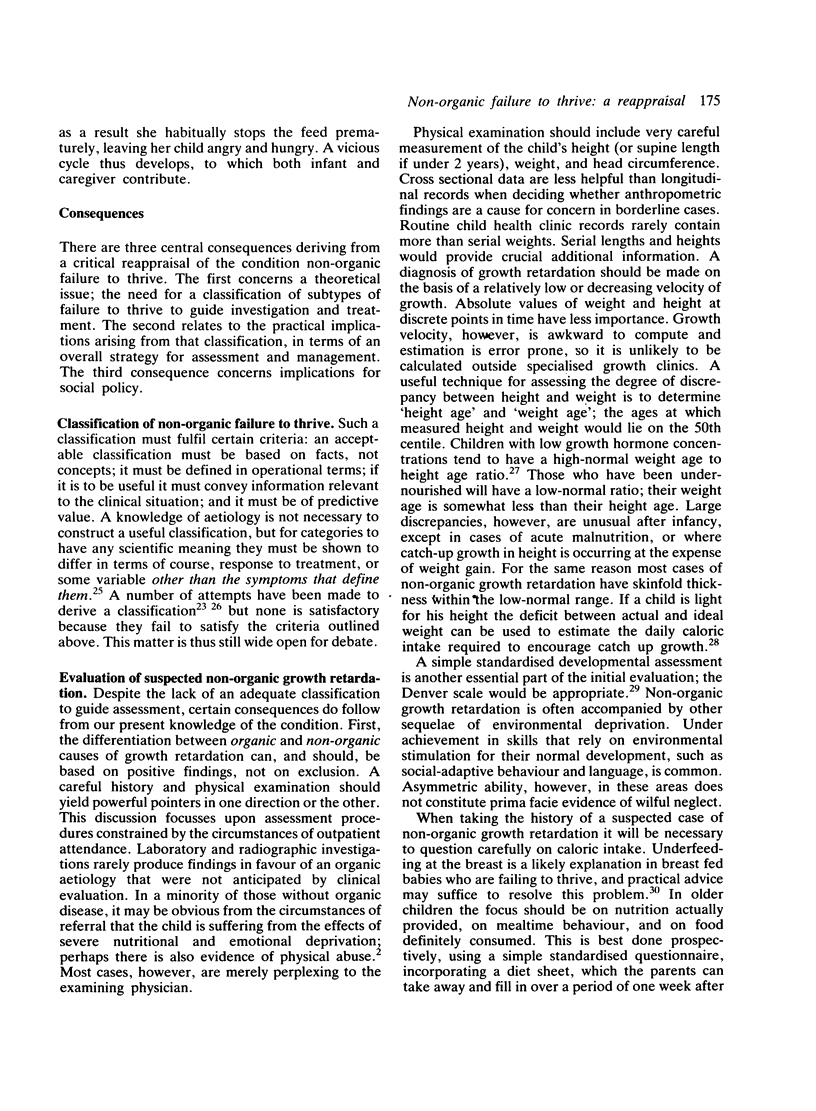
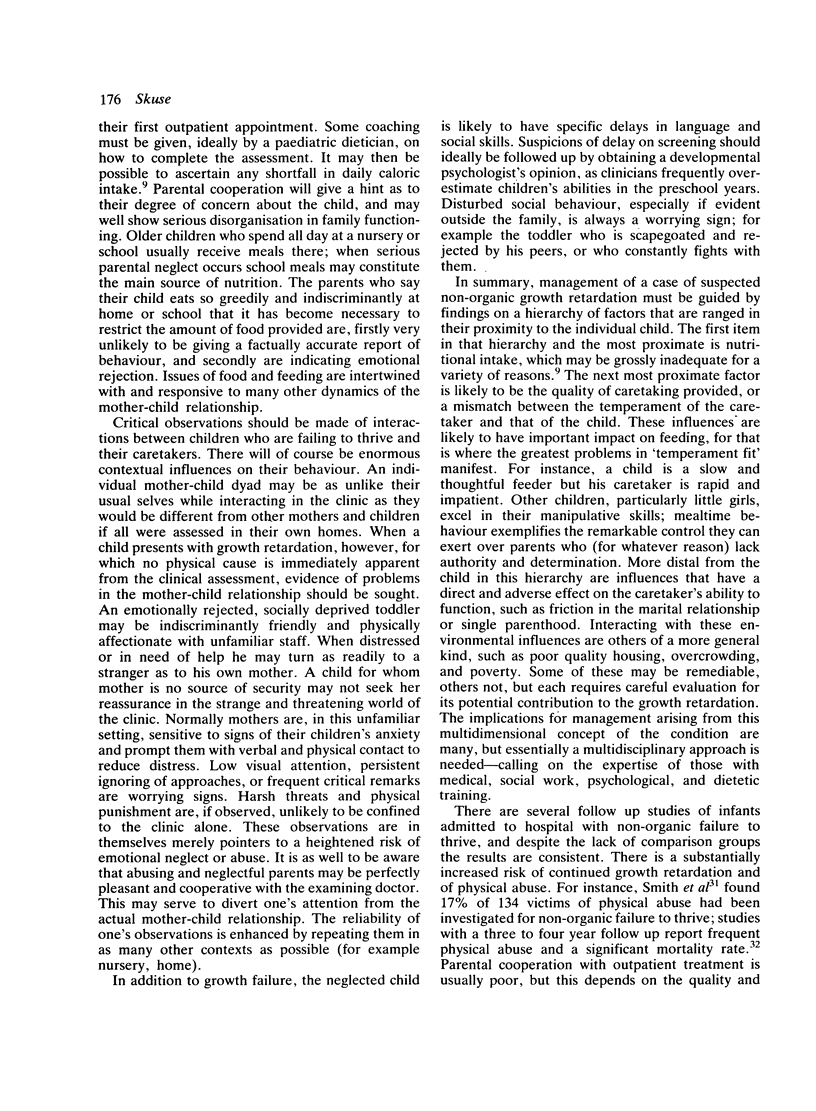
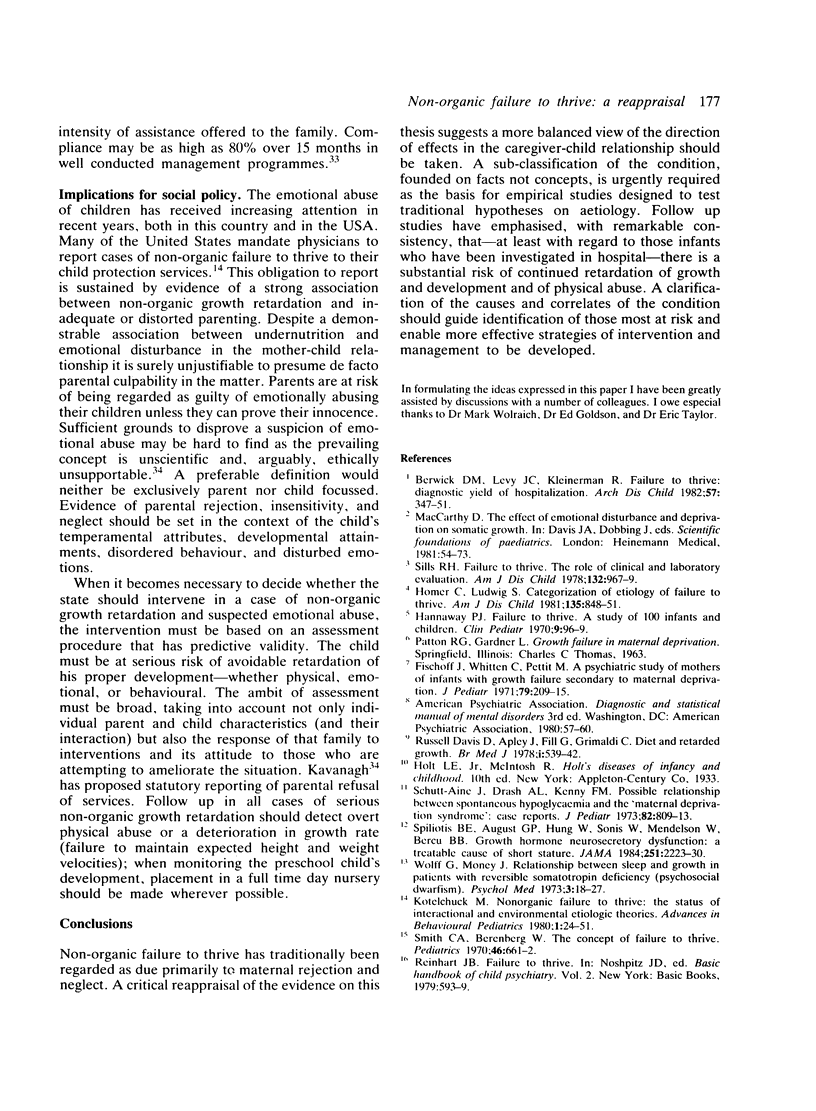
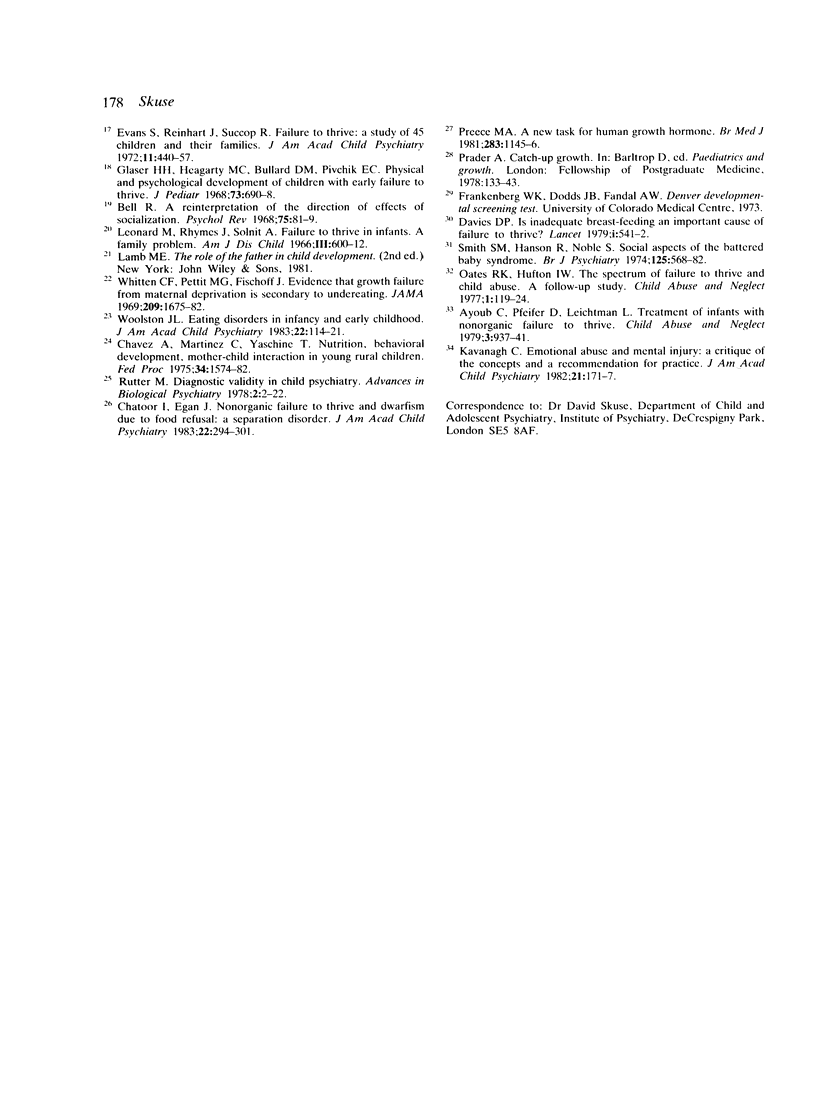
Selected References
These references are in PubMed. This may not be the complete list of references from this article.
- Berwick D. M., Levy J. C., Kleinerman R. Failure to thrive: diagnostic yield of hospitalisation. Arch Dis Child. 1982 May;57(5):347–351. doi: 10.1136/adc.57.5.347. [DOI] [PMC free article] [PubMed] [Google Scholar]
- Chatoor I., Egan J. Nonorganic failure to thrive and dwarfism due to food refusal: a separation disorder. J Am Acad Child Psychiatry. 1983 May;22(3):294–301. doi: 10.1016/s0002-7138(09)60380-0. [DOI] [PubMed] [Google Scholar]
- Chavez A., Martinez C., Yaschine T. Nutrition, behavioral development, and mother-child interaction in young rural children. Fed Proc. 1975 Jun;34(7):1574–1582. [PubMed] [Google Scholar]
- Davies D. P. Is inadequate breast-feeding an important cause of failure to thrive? Lancet. 1979 Mar 10;1(8115):541–542. doi: 10.1016/s0140-6736(79)90956-5. [DOI] [PubMed] [Google Scholar]
- Davis D. R., Apley J., Fill G., Grimaldi C. Diet and retarded growth. Br Med J. 1978 Mar 4;1(6112):539–542. doi: 10.1136/bmj.1.6112.539. [DOI] [PMC free article] [PubMed] [Google Scholar]
- Fischhoff J., Whitten C. F., Pettit M. G. A psychiatric study of mothers of infants with growth failure secondary to maternal deprivation. J Pediatr. 1971 Aug;79(2):209–215. doi: 10.1016/s0022-3476(71)80103-8. [DOI] [PubMed] [Google Scholar]
- Glaser H. H., Heagarty M. C., Bullard D. M., Jr, Pivchik E. C. Physical and psychological development of children with early failure to thrive. J Pediatr. 1968 Nov;73(5):690–698. doi: 10.1016/s0022-3476(68)80174-x. [DOI] [PubMed] [Google Scholar]
- Hannaway P. J. Failure to thrive: a study of 100 infants and children. Clin Pediatr (Phila) 1970 Feb;9(2):96–99. doi: 10.1177/000992287000900214. [DOI] [PubMed] [Google Scholar]
- Homer C., Ludwig S. Categorization of etiology of failure to thrive. Am J Dis Child. 1981 Sep;135(9):848–851. doi: 10.1001/archpedi.1981.02130330058019. [DOI] [PubMed] [Google Scholar]
- Kavanagh C. Emotional abuse and mental injury. A critique of the concepts and a recommendation for practice. J Am Acad Child Psychiatry. 1982 Mar;21(2):171–177. doi: 10.1016/s0002-7138(09)60916-x. [DOI] [PubMed] [Google Scholar]
- Preece M. A. A new task for human growth hormone? Br Med J (Clin Res Ed) 1981 Oct 31;283(6300):1145–1146. doi: 10.1136/bmj.283.6300.1145. [DOI] [PMC free article] [PubMed] [Google Scholar]
- Schutt-Aine J. C., Drash A. L., Kenny F. M. Possible relationship between spontaneous hypoglycemia and the "maternal deprivation syndrome": case reports. J Pediatr. 1973 May;82(5):809–813. doi: 10.1016/s0022-3476(73)80071-x. [DOI] [PubMed] [Google Scholar]
- Sills R. H. Failure to thrive. The role of clinical and laboratory evaluation. Am J Dis Child. 1978 Oct;132(10):967–969. doi: 10.1001/archpedi.1978.02120350031003. [DOI] [PubMed] [Google Scholar]
- Smith S. M., Hanson R., Noble S. Social aspects of the battered baby syndrome. Br J Psychiatry. 1974 Dec;125:568–582. doi: 10.1192/bjp.125.6.568. [DOI] [PubMed] [Google Scholar]
- Spiliotis B. E., August G. P., Hung W., Sonis W., Mendelson W., Bercu B. B. Growth hormone neurosecretory dysfunction. A treatable cause of short stature. JAMA. 1984 May 4;251(17):2223–2230. [PubMed] [Google Scholar]
- Whitten C. F., Pettit M. G., Fischhoff J. Evidence that growth failure from maternal deprivation is secondary to undereating. JAMA. 1969 Sep 15;209(11):1675–1682. [PubMed] [Google Scholar]
- Wolff G., Money J. Relationship between sleep and growth in patients with reversible somatotropin deficiency (psychosocial dwarfism). Psychol Med. 1973 Feb;3(1):18–27. doi: 10.1017/s0033291700046316. [DOI] [PubMed] [Google Scholar]
- Woolston J. L. Eating disorders in infancy and early childhood. J Am Acad Child Psychiatry. 1983 Mar;22(2):114–121. doi: 10.1016/s0002-7138(09)62322-0. [DOI] [PubMed] [Google Scholar]


